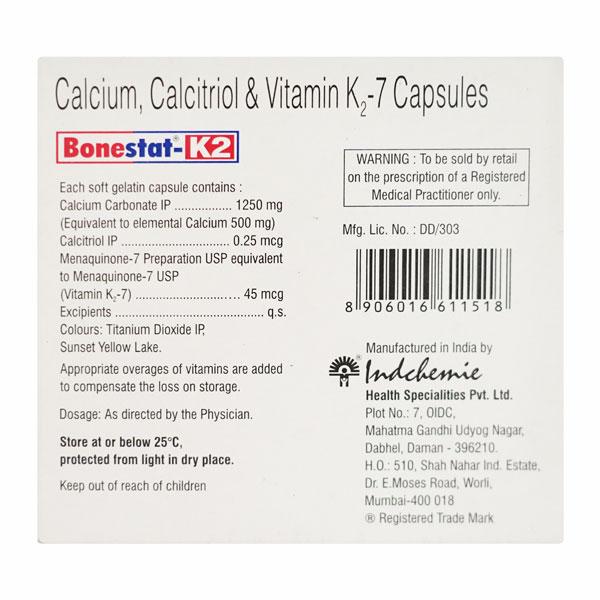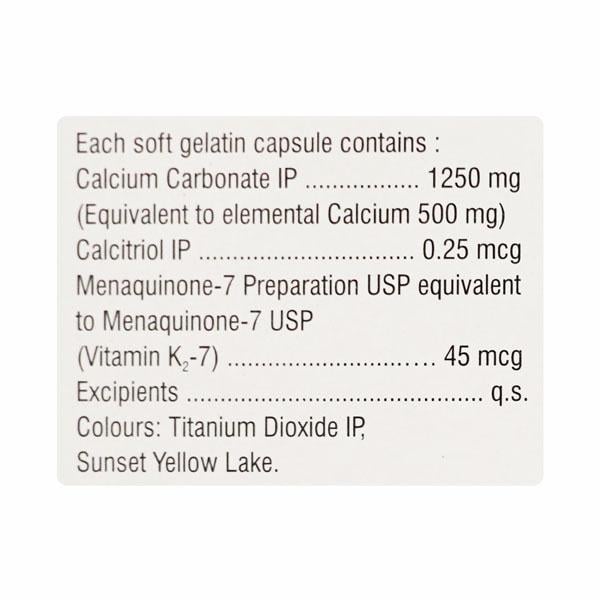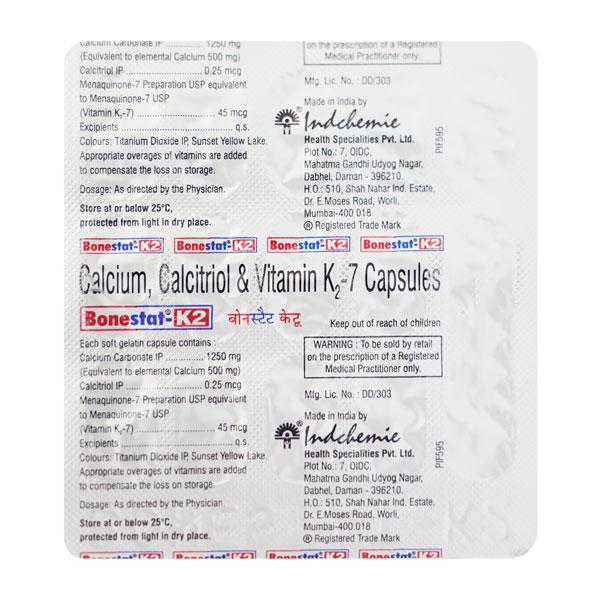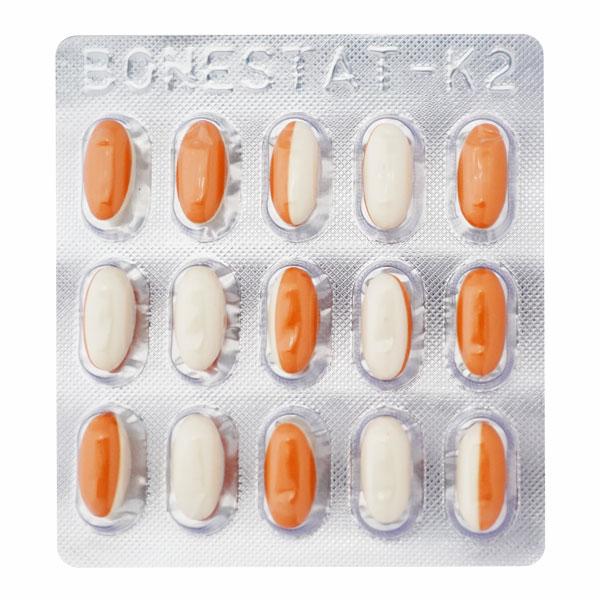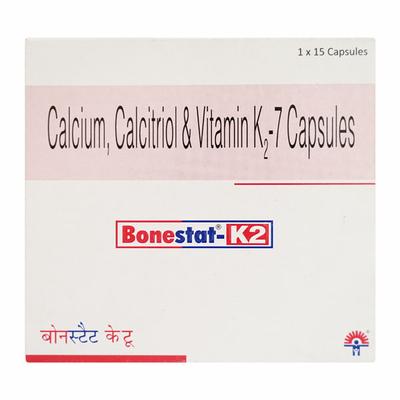

Netmeds First Membership
Quick Links
Introduction About BONESTAT K2 CAPSULE
BONESTAT K2 CAPSULE is a combination of Calcitriol, Calcium Carbonate, and Menaquinone, which belongs to the group of medicines called Nutritional Supplements. It is used to manage osteoporosis.
Osteoporosis is a condition that causes the thinning and weakening of bones because of the excessive absorption of calcium from the bones. It is characterized by symptoms such as bleeding gums, weak grip strength, brittle fingernails, loss of height, frequent fractures, and neck and back pain.
BONESTAT K2 CAPSULE is not recommended for use if you are allergic to calcitriol or calcium. It is also not recommended for use if you have kidney stones, hypercalcaemia (high blood calcium levels), or evidence of vitamin D toxicity.
BONESTAT K2 CAPSULE should be used with caution in cases of hepatic insufficiency, nephrotic diseases (a kidney disease causing excess protein in your urine), chronic renal failure, and a high tendency to get kidney stones. BONESTAT K2 CAPSULE should also be used with caution in patients undergoing dialysis.
BONESTAT K2 CAPSULE should be used with caution by pregnant women only if necessary. BONESTAT K2 CAPSULE is not recommended to be used by breastfeeding women. It should be used with caution in children (under 6 years of age) and elderly patients (aged 65 years or older). Consult your doctor before taking it.
The common side effects associated with the use of BONESTAT K2 CAPSULE are diarrhea, constipation, an upset stomach, and abdominal pain. Contact your doctor or a nearby hospital if any of the conditions worsen.
Uses Of BONESTAT K2 CAPSULE
- To manage osteoporosis
How BONESTAT K2 CAPSULE Works
BONESTAT K2 CAPSULE helps in managing bone weakening, where calcitriol plays a very important role in aiding the absorption of calcium by acting on certain gut cells to increase the production of calcium transport proteins, whereas calcium carbonate acts by directly increasing the calcium stores in the body.
Vitamin K activates the calcium-binding actions of two proteins (the matrix GLA protein and osteocalcin), which helps in enhancing calcium absorption in the body, thereby increasing bone mass and strength.
How to use BONESTAT K2 CAPSULE
Take BONESTAT K2 CAPSULE as advised by your physician. Swallow the medicine with a glass of water with food. Do not crush or chew the medicine. Your doctor will decide the correct dose and duration for you depending on your age, body weight, and disease condition.
Side Effects Of BONESTAT K2 CAPSULE
Common
- diarrhoea
- constipation
- upset stomach
- abdominal pain
Uncommon
- excessive amounts of calcium in the blood or your urine
Rare
- flatulence
- indigestion
Stop taking BONESTAT K2 CAPSULE and contact your doctor if you experience any of the following side effects:
- signs of high blood calcium levels, such as stomach upset, nausea, vomiting, and constipation
- frequent urge to urinate
- headache
- loss of appetite, nausea, or vomiting
- unusual tiredness
- weakness
How To Manage Side Effects
Constipation
Try to eat more high-fiber foods, such as fresh fruit, vegetables, and cereals, and drink plenty of water. Try doing exercise regularly (going for a daily walk or run). If this does not help, inform your doctor about receiving alternate managements for constipation.
Diarrhea
Drink lots of fluids, such as water, to keep yourself hydrated. Try to avoid taking any medicine on your own to manage diarrhea and consult your doctor if the symptom gets worse.
Stomach Pain
Try to take BONESTAT K2 CAPSULE with or just after a meal or a snack. Stick to simple meals. Avoid eating rich or spicy food. Consult your doctor if the symptom gets worse.
Warning & Precautions
Pregnancy
Monitoring requiredBONESTAT K2 CAPSULE should be used with caution in pregnant women only if considered necessary. Consult and inform your doctor before taking it.
Breastfeeding
ContraindicatedBONESTAT K2 CAPSULE is not recommended for use in breastfeeding women as it passes through the milk. Consult your doctor before taking it.
Driving and Using Machines
Use with CautionBONESTAT K2 CAPSULE has no or negligible effect on your ability to drive or use machines.
Kidney
Consult your doctorBONESTAT K2 CAPSULE is not recommended for use if you have kidney stones. It should be used with caution in patients with nephrotic diseases (a kidney disease causing an excess of protein in your urine), chronic renal failure, and a high tendency to get kidney stones. It should also be used with caution in patients undergoing dialysis. Consult your doctor for advice before taking it.
Liver
Use with CautionBONESTAT K2 CAPSULE should be used with caution in patients with hepatic insufficiency. Consult your doctor before taking it.
Allergy
ContraindicatedBONESTAT K2 CAPSULE is not recommended for use if you are allergic to calcitriol, calcium, or any of the other ingredients of this medicine. Consult your doctor before taking it.
Use In Pediatrics
Use with CautionBONESTAT K2 CAPSULE should be used with caution in children (below 6 years). Consult your doctor before taking it.
Use In Geriatrics
Use with CautionBONESTAT K2 CAPSULE should be used with caution in elderly patients (aged above 65 years). Consult your doctor before taking it.
Others
BONESTAT K2 CAPSULE is not recommended for use if you:
- have hypercalcaemia (high blood calcium levels) or evidence of vitamin D toxicity
Before taking BONESTAT K2 CAPSULE, inform your doctor if you:
- are immobilized patients or have undergone surgery
- have a high serum phosphorus level
- have cancer or any other conditions that may affect bones
Interactions
A. Drug-Drug Interactions:
Before taking BONESTAT K2 CAPSULE, inform your doctor if you are taking any of the following medicines:
- magnesium-containing antacids (medicines used to manage acidity) Ex. magnesium carbonate
- digitalis (a medicine used to manage an irregular heartbeat)
- barbiturates (a medicine used to manage depression) Ex. phenobarbital
- anticonvulsants (medicines used to manage seizures) Ex. carbamazepine
- cholestyramine (medicines used to lower blood cholesterol levels)
- calcium channel blockers (medicines used to manage raised blood pressure) Ex. verapamil
- hormonal preparations (medicines used to manage hormonal imbalances in women) Ex. oestrogens
- etidronate (a medicine used to manage Paget’s disease)
- gallium (a medicine used to manage certain cancers and calcium disorders)
- phenytoin (a medicine used to manage seizures)
- broad-spectrum antibiotics (medicines used to manage bacterial infections) tetracyclines (Ex. doxycycline), fluoroquinolones (Ex. levofloxacin), cephalosporins (Ex. cefdinir), and quinolone antibiotics (Ex. ciprofloxacin, lomefloxacin, norfloxacin, and sparfloxacin)
- salicylates (medicines used to manage pain and inflammation) Ex. diclofenac
- anticoagulants (medicines used to delay clotting) Ex. heparin, warfarin
- thiazides (medicines used to manage high blood pressure) Ex. chlorothiazide
- ketoconazole (a medicine used to manage infections caused by fungi)
- corticosteroids (medicines used to manage inflammation) Ex. dexamethasone
- phosphate-binding agents (medicines used to manage phosphorus absorption in the body) Ex. sevelamer
- vitamin D, calcium, iron, zinc, and strontium ranelate preparations
- levothyroxine (a hormonal preparation used to manage thyroid deficiency)
- bisphosphonates (medicines used to manage bone problems) Ex. zoledronic acid
Overdosage:
If you or anyone else accidentally takes too much of BONESTAT K2 CAPSULE, consult your doctor immediately or visit the nearby hospital. Symptoms of overdose are raised blood calcium levels (increased thirst, frequent urination, stomach pain, nausea, bone pain, muscle weakness, confusion, and fatigue), excess calcium in the urine (blood in urine, pain while urinating), hyperphosphatemia (muscle cramps and numbness), nausea, vomiting, constipation, abdominal pain, muscle weakness, tiredness, mental disturbances, lack of appetite, bone pain, kidney problems, irregular heartbeat, irritability, continuing headache, light-headedness, muscle spasms, twitches, and tingling sensation.
Synopsis
| Drug | : | Calcitriol, Calcium Carbonate, and Menaquinone |
| Pharmacological Category | : | Nutritional supplements |
| Therapeutic Indication | : | Osteoporosis |
| Dosage Forms | : | Tablet, Capsule |
More Information
- Keep BONESTAT K2 CAPSULE out of the reach of children
- Store BONESTAT K2 CAPSULE at room temperature
FAQs About BONESTAT K2 CAPSULE
Q: What is BONESTAT K2 CAPSULE used for?
A: BONESTAT K2 CAPSULE is used to manage osteoporosis, which is a condition that causes thinning and weakening of bones because of excessive absorption of calcium from the bones. It is characterized by symptoms such as bleeding gums, weak grip strength, brittle fingernails, loss of height, frequent fractures, and neck and back pain.
Q: What happens if you take more BONESTAT K2 CAPSULE than your required dose?
A: If you or anyone else accidentally takes too much BONESTAT K2 CAPSULE, consult your doctor immediately or visit the nearby hospital. Symptoms of an overdose are increased blood calcium levels (increased thirst, frequent urination, stomach pain, nausea, bone pain, muscle weakness, confusion, and fatigue), excess calcium in the urine (blood in urine, pain while urinating), hyperphosphatemia (muscle cramps and numbness), nausea, vomiting, constipation, abdominal pain, muscle weakness, tiredness, mental disturbances, lack of appetite, bone pain, kidney problems, an irregular heartbeat, irritability, a continuing headache, lightheadedness, and muscle spasms, twitches, and a tingling sensation are also symptoms.
Q: What side effects are seen with BONESTAT K2 CAPSULE?
A: The common side effects associated with the use of BONESTAT K2 CAPSULE are diarrhea, constipation, an upset stomach, and abdominal pain. Contact your doctor or a nearby hospital if any of the conditions worsen.
Q: Who should avoid taking BONESTAT K2 CAPSULE?
A: BONESTAT K2 CAPSULE is not recommended for use if you are allergic to calcitriol or calcium. It is also not recommended for use if you have kidney stones, hypercalcaemia (high blood calcium levels), or evidence of vitamin D toxicity. It is not recommended to be used by breastfeeding women. Consult your doctor before taking it.
Q: Is BONESTAT K2 CAPSULE safe to use in children or elderly patients?
A: BONESTAT K2 CAPSULE should be used with caution in children (below 6 years) and elderly patients (aged 65 years or older). Your doctor will determine the correct dose and duration for you depending upon your age, body weight, and disease condition.
Q: How does BONESTAT K2 CAPSULE work?
A: BONESTAT K2 CAPSULE helps in managing bone weakening, where calcitriol plays a very important role in aiding the absorption of calcium by acting on certain gut cells to increase the production of calcium transport proteins, whereas calcium carbonate acts by directly increasing the calcium stores in the body. Vitamin K activates the calcium-binding actions of two proteins (the matrix GLA protein and osteocalcin), which helps in enhancing calcium absorption in the body, thereby increasing bone mass and strength.
Q: What is the method of taking BONESTAT K2 CAPSULE?
A: Take BONESTAT K2 CAPSULE as advised by your physician. Swallow the medicine with a glass of water and food. Do not crush or chew the medicine. Your doctor will determine the correct dose and duration for you depending upon your age, body weight, and disease condition.
Q: What if I forget to take my BONESTAT K2 CAPSULE dose?
A: If you forgot to take your BONESTAT K2 CAPSULE dose, take it as early as possible. Do not double up the dose to make up for the forgotten one. Consult your doctor before taking it.
Q: Is BONESTAT K2 CAPSULE safe to use in kidney patients?
A: BONESTAT K2 CAPSULE is not recommended for use if you have kidney stones. It should be used with caution in patients with nephrotic diseases (a kidney disease causing excess protein in your urine), chronic renal failure, or a high tendency to get kidney stones. It should also be used with caution in patients undergoing dialysis. Consult your doctor for advice before taking it.
Q: Is BONESTAT K2 CAPSULE safe for use by pregnant and breastfeeding women?
A: BONESTAT K2 CAPSULE should be used with caution in pregnant women only if clearly necessary. It is not recommended to be used by breastfeeding women. Consult your doctor before taking it.
References
1. KD. Tripathi. Drugs Affecting Calcium Balance. Essentials of medical pharmacology. Seventh edition. 2013. Page 341.
2. Adriana J. van Ballegooijen, Stefan Pilz, Andreas Tomaschitz, Martin R. Grübler, Nicolas Verheyen. The Synergistic Interplay between Vitamins D and K for Bone and Cardiovascular Health: A Narrative Review. NIH National Library of Medicine. National Centre for Biotechnology Information. PMC PubMed Central. September 2017. [Assessed on 12th February 2024] https://www.ncbi.nlm.nih.gov/pmc/articles/PMC5613455/
3. Takeda AS, Drammensveien 852. Electronic Medicines Compendium (EMC). [Revised in September 2021] [Assessed on 12th February 2024] https://www.medicines.org.uk/emc/files/pil.12847.pdf
4. Alkem Labs. Gemcal DS. [Assessed on 12th February 2024] https://www.alkemlabs.com/pdf/adverse/GEMCAL%20DS.pdf
5. Dailymed. Calcitriol Capsules (0.25 mcg and 0.5 mcg). [Revised in March 2022] [Assessed on 12th February 2024] https://dailymed.nlm.nih.gov/dailymed/drugInfo.cfm?setid=2b48f57a-c023-485d-b846-cab3aaaad486
6. Torrent Pharma. Shelcal-K. [Assessed on 12th February 2024] https://www.torrentpharma.com/pdf/theraputic_areas/Pain_Therapy.pdf
7. Leeford. CETJOINT K2 7. [Assessed on 12th February 2024] https://www.leeford.in/product/489/cetjoint-k2-7
8. Leeford. RECALMIN-D3 STRONG. [Assessed on 12th February 2024] https://www.leeford.in/product/1076/recalmin-d3-strong
Useful Diagnostic Tests
- Calcium
- Vitamin D 1,25 Dihydroxy
- Extended Arthritis Care
- Comprehensive Arthritis Care
- Basic Bone Care
- Advance Bone Care
- Comprehensive Bone Care
- Esr Automated
- Basic Arthritis Care Plan
- Bone Strength Package
- Arthritis Profile-Basic
- Arthritis Profile-Advanced
- Kidney Function Test (KFT)
- Serum Electrolytes/ Electrolytes Profile
- Pth-Intact Molecule Parathyroid Hormone










